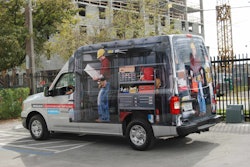The United States needs to increase its investments in highway infrastructure, funding that can be obtained by raising the fuel tax, Celadon Group Inc. Chairman and Chief Executive Officer Steve Russell told members of Congress during a listening session last week.
“We need to solve the problem of improving our transportation system,” said Russell, a member of the American Trucking Associations’ board of directors. “Highway congestion is hurting our economy – to the tune of an estimated 4 billion wasted hours and 5 billon gallons of wasted fuel.”
Currently, the United States spends just 2 percent of its gross domestic product on highways, lagging behind the 5 percent typically spent in Europe and the 9 percent being spent by China, Russell told House Transportation and Infrastructure Committee Chairman John Mica, Rep. Larry Bucshon and other members of the panel.
Russell said that the most effective and equitable way to raise the necessary funds for highway improvements is by raising the fuel tax. “Currently, the federal gasoline tax is 18.4 cents a gallon, and the diesel tax is 24.4 cents, and neither has been raised since 1993,” he said. “If those rates had been adjusted just 3 percent a year to adjust for inflation over the past 18 years, the tax rates would be 31 cents a gallon for gasoline and 42 cents for diesel.”
Those increased rates, Russell said, could generate an additional $25 billion a year for improving existing highways, increasing capacity and relieving congestion on the roads and bridges that trucks use to haul roughly 70 percent of the nation’s freight.
The transportation investments proposed in Obama’s fiscal year 2012 budget, the first year of a six-year transportation plan, would provide $336 billion, a 48 percent increase over the previous authorization, to rebuild roads and bridges, and $119 billion, a 128 percent increase over the previous authorization, in funding for sustainable and efficient transit options. The budget would establish a National Infrastructure Bank that would leverage private capital to build complex large-scale projects that hold significant economic benefits to a region or the nation as a whole.
ATA, however, has said that the budget and outline for reauthorization fall short of dealing with the transportation needs of the nation’s consumers and shippers. “The proposal gives short shrift to our nation’s highways, which Americans overwhelmingly rely on for their daily transportation needs and goods movement,” said Bill Graves, ATA president and chief executive officer.
Graves said ATA continues to support an increase in federal taxes on gasoline and diesel fuel to finance needed road and bridge projects “even though we have been told a fuel tax increase is off the table – because our members understand that roads aren’t free and they’re not cheap. While the administration is correct that we need massive long-term investments in transportation, these proposals beg the question of who is going to pay for it and what are they paying for.”
Keith Tuttle, president of Motor Carrier Services Inc. of Northwood, Ohio, told the House committee that congestion is choking the nation’s supply chain and economy. “As the owner of a small trucking company of 90 trucks, I know our nation’s inventory moves in our industry’s trailers,” Tuttle said. “We can talk about shifting goods to rail or boosting intermodal freight, but the great majority of this country’s cities are still served only by trucks.”
Tuttle, chairman of ATA’s Small Carrier Advisory Committee, said that congestion across the country can prevent his trucks from making their appointed rounds. “From our headquarters in northwest Ohio, if we have to send trucks to deep into Chicago – near the airports or to the north side – it is impossible for us to drop our load, pick up a new load and return home because of the congestion,” he said. “Our primary run takes us to New Jersey, where we deliver cans that are used in production the next day typically, and congestion can prevent those trucks from getting there on time.”
Tuttle told the panel that those congestion problems only would be exacerbated by proposed changes to the hours-of-service rules that govern truckers since the Obama administration is contemplating reducing the allowable driving time to 10 hours from the current limit of 11 and making changes to the 34-hour restart that would require it be taken over two nights. Those changes, he said, would put more trucks on the road, adding to already congested roads.
Tuttle said it was important to increase funding for infrastructure and that as an industry “trucking supports raising the fuel tax if it is used on things that improve efficiency. The fuel tax is by far the most efficient system for raising the funds we need,” he said, adding that ATA was opposed to use of tolls to pay for needed infrastructure improvements.











